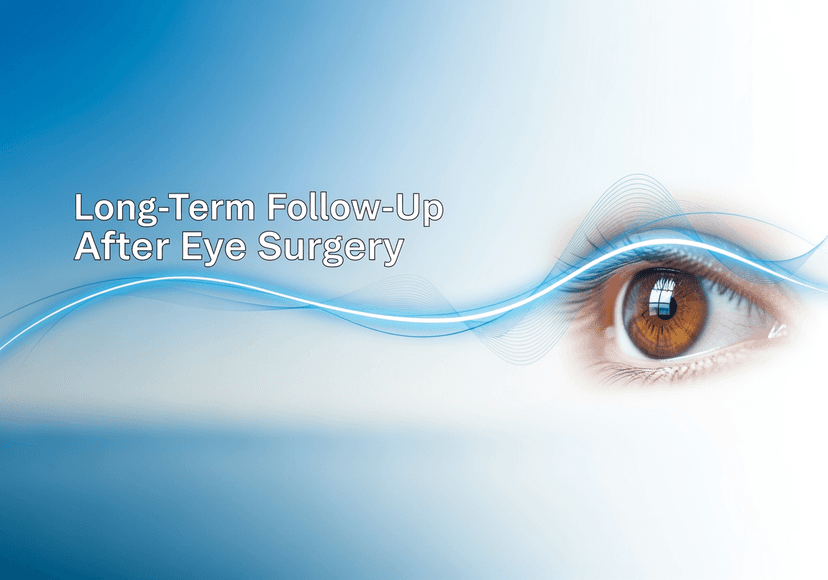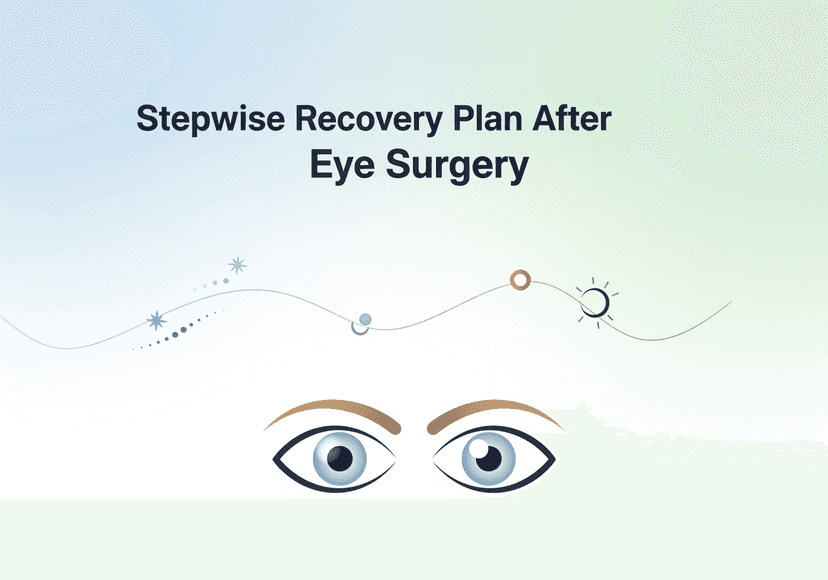
Frequently Asked Questions About Eye Surgery
31 Oct, 2025
 Healthtrip
Healthtrip- What are the Different Types of Eye Surgery?
- Who is a Good Candidate for Eye Surgery?
- How to Prepare for Eye Surgery: A Step-by-Step Guide
- What are the Common Risks and Complications of Eye Surgery? < li>What to Expect During Eye Surgery Recovery and Aftercare.
- How Much Does Eye Surgery Cost, and What Factors Affect the Price? < li>Where Can I Find Reputable Eye Surgery Clinics and Hospitals?
- Saudi German Hospital Alexandria, Egypt
- Breyer, Kaymak & Klabe Augenchirurgie
- Fortis Escorts Heart Institute
- Yanhee International Hospital
- Vejthani Hospital
- Memorial Bahçelievler Hospital
- NMC Specialty Hospital, Al Nahda, Dubai
- Real Clinic
- Saudi German Hospital Cairo, Egypt
- Helios Klinikum Erfurt
- Fortis Hospital, Noida
- Pantai Hospital Kuala Lumpur, Malaysia
- IERA Lisbon Assisted Reproduction Institute
- Saudi German Hospital Al-Madinah Almonawara
- Mount Elizabeth Hospital
- Singapore General Hospital
- Jiménez Díaz Foundation University Hospital
- Quironsalud Hospital Murcia
- Bangkok Hospital
- BNH Hospital
- Taoufik Hospitals Group, Tunisia
- LIV Hospital, Istanbul
- Hisar Intercontinental Hospital
- NMC Royal Hospital, DIP, Dubai
- NMC Specialty Hospital, Abu Dhabi
- London Medical
What are the most common types of eye surgery?
There are several types of eye surgeries, each designed to address specific vision problems. Cataract surgery is perhaps the most common, involving the removal of a clouded lens and replacing it with an artificial one. Refractive surgeries, like LASIK and PRK, reshape the cornea to correct nearsightedness, farsightedness, and astigmatism, allowing you to see clearly without glasses or contacts. Glaucoma surgeries aim to lower intraocular pressure to prevent further damage to the optic nerve, preserving your remaining vision. There are also procedures to correct strabismus (crossed eyes) and ptosis (drooping eyelids). Vitrectomy, another common procedure, addresses problems with the vitreous humor, the gel-like substance that fills the eye. If you're experiencing any visual disturbances, consulting with an ophthalmologist at a reputable facility like Vejthani Hospital in Bangkok or Helios Klinikum Erfurt in Germany, is the first step in determining the appropriate course of action. Healthtrip can help you connect with experienced specialists and find the best treatment options tailored to your specific needs, ensuring you receive personalized care and guidance throughout your eye surgery journey. With so many options available, finding the right solution for your vision is more attainable than ever.
Most popular procedures in India
Am I a good candidate for LASIK eye surgery?
Determining if you're a good candidate for LASIK involves several factors. Generally, you need to be at least 18 years old, as your vision should be stable. A stable prescription for at least a year prior to surgery is crucial for optimal results. Your cornea needs to be thick enough to allow for reshaping, and you shouldn't have certain eye conditions like severe dry eye, glaucoma, or cataracts. Overall health plays a role too; certain autoimmune diseases or uncontrolled diabetes might affect healing. During a thorough evaluation, an ophthalmologist will assess your corneal thickness, pupil size, refractive error, and overall eye health. The evaluation might lead you to alternative vision correction surgeries if LASIK isn't suitable. For example, PRK, SMILE, or phakic IOLs may be better options. Remember, your eye health is paramount; don't hesitate to get an expert opinion from hospitals with experienced eye doctors, such as Fortis Memorial Research Institute in Gurgaon or Quironsalud Hospital Murcia in Spain. Healthtrip can assist you in finding qualified professionals for thorough evaluations and consultations to ensure you make the best decision for your vision.
Wellness Treatments
Give yourself the time to relax
Lowest Prices Guaranteed!

Lowest Prices Guaranteed!
What is the recovery process like after eye surgery?
The recovery process after eye surgery varies depending on the type of procedure. After cataract surgery, most people experience improved vision within a few days and can resume normal activities within a week or two. LASIK recovery is also relatively quick, with many patients achieving clear vision within 24 hours. However, it's essential to follow your surgeon's instructions carefully, which may include using eye drops to prevent infection and reduce inflammation. You might experience some discomfort, such as blurry vision, scratchiness, or sensitivity to light, but these symptoms typically subside within a few days. Avoiding strenuous activities, rubbing your eyes, and wearing protective eyewear are crucial during the initial recovery period. Regular follow-up appointments are necessary to monitor your progress and ensure proper healing. For more complex procedures like glaucoma surgery or vitrectomy, the recovery period may be longer, and strict adherence to post-operative care is even more critical. Consider consulting with specialists at reputable hospitals like Bangkok Hospital in Thailand or Saudi German Hospital Cairo in Egypt for detailed information about recovery timelines and potential complications. Healthtrip can connect you with healthcare providers who offer comprehensive post-operative care and support to ensure a smooth and successful recovery.
What are the risks and potential complications of eye surgery?
Like any surgical procedure, eye surgery carries potential risks and complications, although they are generally rare. With cataract surgery, risks include infection, bleeding, swelling, and retinal detachment. LASIK can sometimes result in dry eyes, halos around lights, or under-correction or over-correction of vision, requiring further treatment. Glaucoma surgery may lead to hypotony (low eye pressure) or cataract formation. While these complications are uncommon, it's crucial to be aware of them and discuss them with your surgeon before proceeding. Choosing an experienced surgeon and a reputable facility can significantly minimize these risks. For example, hospitals like Memorial Bahçelievler Hospital in Istanbul or NMC Specialty Hospital, Al Nahda, Dubai, adhere to the highest safety standards. Healthtrip can help you find accredited hospitals and qualified surgeons who prioritize patient safety and utilize advanced technology. It's also important to follow all pre- and post-operative instructions carefully to reduce the likelihood of complications. Remember that open communication with your healthcare team is vital for addressing any concerns and ensuring the best possible outcome for your eye surgery.
How much does eye surgery cost, and does insurance cover it?
The cost of eye surgery varies considerably depending on the type of procedure, the technology used, and the location of the clinic or hospital. LASIK and other refractive surgeries are often considered elective procedures and may not be fully covered by insurance. However, some insurance plans may offer partial coverage or discounts. Cataract surgery, on the other hand, is usually covered by insurance, especially if it's deemed medically necessary. Glaucoma surgery and other vision-saving procedures are also typically covered. It's essential to check with your insurance provider to understand your specific coverage and any out-of-pocket expenses you might incur. Many hospitals and clinics offer financing options or payment plans to make eye surgery more affordable. When considering your budget, remember that the expertise of the surgeon and the quality of the facility are just as important as the price. Exploring options in different countries through Healthtrip could reveal cost-effective, high-quality care at hospitals like Taoufik Clinic in Tunisia or KPJ Ampang Puteri Specialist Hospital, Kuala Lumpur, Malaysia. Healthtrip can provide you with cost estimates, insurance information, and financing options to help you make an informed decision that fits your financial situation and prioritizes your eye health.
What are the Different Types of Eye Surgery?
Eye surgery encompasses a wide array of procedures designed to correct vision problems, treat eye diseases, and improve overall eye health. From the well-known LASIK to more intricate surgeries addressing cataracts or glaucoma, the options available today are incredibly diverse and tailored to meet individual needs. Understanding the different types of eye surgery is the first step in making informed decisions about your vision care, especially if you're considering traveling for treatment through services like Healthtrip. Perhaps you've been squinting a bit more lately, or maybe your favorite book is becoming increasingly blurry – these are signs that it might be time to explore the possibilities. We'll delve into the specifics of each surgery, explaining what they entail, who they benefit most, and what you can expect in terms of recovery. Think of this as your friendly guide to navigating the world of eye surgery, helping you see the possibilities – pun intended! Eye surgery isn't just about improving eyesight; it's about enhancing your quality of life, allowing you to experience the world with clarity and vibrancy.
Refractive Surgery: Correcting Vision Errors
Refractive surgeries are designed to correct common vision problems like nearsightedness (myopia), farsightedness (hyperopia), and astigmatism. LASIK (Laser-Assisted In Situ Keratomileusis) is perhaps the most well-known of these, using a laser to reshape the cornea, the eye's clear front surface, allowing light to focus properly on the retina. Imagine waking up every morning and seeing the world in sharp focus without reaching for your glasses – that's the promise of LASIK. Another popular option is PRK (Photorefractive Keratectomy), which also reshapes the cornea but involves removing the outer layer of the cornea, which then grows back naturally. SMILE (Small Incision Lenticule Extraction) is a newer, minimally invasive procedure that involves removing a small piece of corneal tissue to correct vision. These surgeries are often quick, with relatively short recovery times, making them attractive options for those seeking freedom from glasses or contacts. For instance, you might consider traveling to facilities like Breyer, Kaymak & Klabe Augenchirurgie in Germany, accessible through Healthtrip, known for their expertise in refractive surgery. Remember, a consultation with an ophthalmologist is crucial to determine which procedure is best suited for your individual eye condition and refractive error.
Cataract Surgery: Restoring Clarity
Cataracts, the clouding of the eye's natural lens, are a common age-related condition that can significantly impair vision. Cataract surgery involves removing the cloudy lens and replacing it with a clear artificial lens, called an intraocular lens (IOL). It's one of the most frequently performed and safest surgeries worldwide. Modern cataract surgery is typically performed using phacoemulsification, a technique that uses ultrasound waves to break up the cloudy lens, which is then gently suctioned out. Think of it as a meticulous cleaning of your eye's window. The procedure is often done on an outpatient basis, with patients experiencing improved vision within a few days. Different types of IOLs are available, including monofocal lenses that provide clear vision at one distance (usually far) and multifocal lenses that can provide clear vision at multiple distances. For those considering cataract surgery abroad, Healthtrip can connect you with reputable hospitals like Saudi German Hospital Alexandria, Egypt or Saudi German Hospital Cairo, Egypt, both known for their advanced ophthalmology departments. Cataract surgery can dramatically improve your vision, allowing you to enjoy activities like reading, driving, and watching your favorite shows with newfound clarity.
Glaucoma Surgery: Managing Eye Pressure
Glaucoma is a condition that damages the optic nerve, often due to increased pressure inside the eye. While there's no cure for glaucoma, surgery can help manage the pressure and prevent further vision loss. There are several types of glaucoma surgery, including trabeculectomy, which creates a new channel for fluid to drain from the eye, and minimally invasive glaucoma surgery (MIGS), which uses tiny devices to improve fluid outflow. MIGS procedures are often less invasive than traditional surgery, with faster recovery times. Imagine your eye as a sink; glaucoma surgery helps ensure the drain is working properly to prevent overflow. Early detection and management of glaucoma are crucial to preserving vision. Healthtrip can help you explore options for glaucoma treatment, potentially at institutions like Fortis Hospital, Noida, equipped with advanced diagnostic and surgical capabilities. If you've been diagnosed with glaucoma, discussing surgical options with your ophthalmologist is essential to determine the best course of action to protect your sight. Glaucoma surgery is not about reversing damage; it's about stabilizing the condition and protecting the vision you still have.
Other Types of Eye Surgery
Beyond refractive, cataract, and glaucoma surgeries, there are many other types of eye surgery designed to address specific conditions. These include surgeries to repair retinal detachments, correct strabismus (misaligned eyes), treat corneal diseases, and remove tumors from the eye or surrounding tissues. Retinal detachment surgery aims to reattach the retina to the back of the eye, often using techniques like vitrectomy or scleral buckling. Strabismus surgery involves adjusting the eye muscles to align the eyes properly, improving vision and appearance. Corneal transplants replace damaged corneal tissue with healthy tissue from a donor, restoring clarity to the eye. The specifics of each surgery vary depending on the condition being treated, but the goal is always to improve vision and eye health. For complex eye conditions requiring specialized care, Healthtrip can connect you with leading medical centers like Vejthani Hospital in Thailand, known for its comprehensive ophthalmology services. No matter the specific eye condition, a thorough evaluation by an experienced ophthalmologist is essential to determine the most appropriate treatment plan. Remember, taking proactive steps to address eye health issues can make a significant difference in preserving your vision for years to come.
Who is a Good Candidate for Eye Surgery?
Determining whether you're a good candidate for eye surgery is a multifaceted process that involves a thorough evaluation of your eye health, medical history, and lifestyle factors. It's not simply about wanting to improve your vision; it's about ensuring that the potential benefits of surgery outweigh the risks and that you have realistic expectations about the outcome. Consider it a careful assessment to match the right procedure to the right person, ensuring the best possible results. Factors such as age, overall health, and the specific eye condition being treated all play a crucial role in determining candidacy. Whether you're exploring laser vision correction, cataract surgery, or other procedures, understanding the criteria for eligibility is paramount. Healthtrip can assist you in finding qualified ophthalmologists who can conduct these comprehensive evaluations and determine the most appropriate treatment options for your individual needs. Think of this process as a roadmap to clearer vision, guiding you through the steps needed to make an informed decision.
Age and General Health Considerations
Age is a significant factor in determining candidacy for certain eye surgeries. For refractive surgeries like LASIK, most surgeons prefer patients to be at least 18 years old, as vision typically stabilizes by this age. However, there's often no upper age limit, provided the eyes are healthy. General health is equally important. Conditions like uncontrolled diabetes, autoimmune diseases, or certain infections can increase the risk of complications and may disqualify you from certain procedures. Pregnancy can also affect vision and is generally a contraindication for refractive surgery. It's essential to have a detailed discussion with your doctor about your medical history and any medications you're taking. Certain medications, such as steroids, can affect healing and may need to be adjusted before surgery. Good overall health is often a prerequisite for successful eye surgery and a smooth recovery. Exploring options with Healthtrip can connect you with facilities that prioritize a holistic approach to patient care, such as Memorial Bahçelievler Hospital in Turkey, which takes into account the entire medical profile before any procedure. Remember, your body's ability to heal effectively is just as important as the surgery itself.
Specific Eye Conditions and Considerations
The specific eye condition being treated plays a crucial role in determining candidacy for eye surgery. For example, individuals with thin corneas or certain corneal abnormalities may not be suitable for LASIK but may be candidates for other refractive procedures like PRK or SMILE. People with dry eyes should have their condition well-managed before undergoing refractive surgery to minimize the risk of post-operative dryness. Those considering cataract surgery should have a significant clouding of their lens that is affecting their daily activities. The extent of damage to the optic nerve in glaucoma patients will influence the surgical approach as well as the expected outcomes. Individuals with uncontrolled glaucoma may not be suitable for certain types of refractive surgery. A thorough eye exam, including measurements of corneal thickness, pupil size, and refractive error, is essential to assess your suitability for surgery. Traveling abroad for eye surgery with Healthtrip can provide access to specialized centers like Yanhee International Hospital in Thailand, known for their expertise in various eye conditions. Each eye condition presents unique challenges, and a careful assessment will help determine the best surgical approach.
Lifestyle and Expectations
Beyond medical and eye health factors, your lifestyle and expectations are also important considerations. If you have a very active lifestyle that involves contact sports or activities with a high risk of eye injury, you may need to weigh the risks and benefits of surgery carefully. It's also important to have realistic expectations about the outcome of surgery. While eye surgery can significantly improve vision, it may not always result in perfect vision. Some people may still need glasses or contacts for certain activities, such as reading or driving at night. Understanding the potential limitations of surgery is crucial for satisfaction with the results. For example, while LASIK can greatly reduce dependence on glasses, it may not eliminate the need for reading glasses as you get older. Open communication with your surgeon about your lifestyle and expectations is essential. Healthtrip can facilitate consultations with experienced doctors at hospitals like NMC Specialty Hospital, Al Nahda, Dubai, who can provide realistic assessments and guidance. Remember, it's about improving your vision and quality of life, not necessarily achieving perfection.
Contraindications for Eye Surgery
Certain conditions may make you an unsuitable candidate for eye surgery, known as contraindications. These can include active eye infections, uncontrolled systemic diseases, severe dry eye syndrome, and certain corneal abnormalities. People with unrealistic expectations or those who are not willing to follow post-operative instructions may also not be good candidates. For refractive surgery, unstable vision or significant changes in prescription in the past year are typically contraindications. If you have a history of herpes simplex keratitis (a viral infection of the cornea), your risk of recurrence after surgery may be higher. Pregnancy and breastfeeding are also generally considered contraindications for refractive surgery. It is crucial that you are honest and upfront with your eye doctor about your medical history, lifestyle, and expectations. Healthtrip can help you find reputable clinics and hospitals like Saudi German Hospital Al-Madinah Almonawara that prioritize patient safety and thorough screening. Identifying and addressing any contraindications before surgery is essential to minimize the risk of complications. Remember, your health and safety are the top priorities.
How to Prepare for Eye Surgery: A Step-by-Step Guide
Preparing for eye surgery is just as crucial as the surgery itself. It’s not simply about showing up on the day; it's a comprehensive process that ensures you're physically and mentally ready for the procedure and the recovery period. Think of it as preparing for a big trip – you wouldn't just pack your bags and go, you'd research your destination, plan your itinerary, and make sure you have everything you need for a smooth journey. Preparing for eye surgery involves a series of steps, from initial consultations and pre-operative assessments to following specific instructions regarding medication, diet, and lifestyle. These steps are designed to minimize risks, optimize outcomes, and make the entire experience as comfortable and stress-free as possible. With Healthtrip, you can access resources and guidance to navigate this process seamlessly, whether you're considering surgery at a local clinic or traveling abroad for treatment. A well-prepared patient is an empowered patient, and this guide will provide you with the knowledge and tools you need to approach your eye surgery with confidence.
Initial Consultation and Evaluation
The first step in preparing for eye surgery is an initial consultation with an experienced ophthalmologist. This is your opportunity to discuss your vision problems, medical history, and expectations for surgery. The ophthalmologist will perform a comprehensive eye exam to assess your overall eye health and determine if you are a good candidate for the procedure you are considering. This exam may include measurements of your refractive error, corneal thickness, pupil size, and intraocular pressure. The doctor will also evaluate your tear film to assess for dry eye syndrome. Be prepared to answer questions about your medical history, allergies, and any medications you are taking. Don't hesitate to ask questions about the surgery, the risks and benefits, and the expected recovery process. This consultation is a crucial step in establishing a good doctor-patient relationship and ensuring that you are fully informed about your options. Healthtrip can help you find reputable clinics and hospitals like Jiménez Díaz Foundation University Hospital in Spain, where you can receive a thorough evaluation by experienced ophthalmologists. Remember, open communication is key to a successful outcome.
Pre-operative Assessments and Instructions
If you are deemed a suitable candidate for eye surgery, the next step is to undergo pre-operative assessments. These may include additional eye exams, blood tests, and imaging studies to further evaluate your eye health and identify any potential risks. Your doctor will provide you with specific instructions on how to prepare for surgery. These instructions may include stopping certain medications, avoiding alcohol, and refraining from wearing contact lenses for a specified period before the procedure. You may also be advised to use special eye drops to prepare your eyes for surgery and to minimize the risk of infection. It is crucial to follow these instructions carefully to ensure the best possible outcome. Be sure to clarify any doubts or concerns you may have with your doctor or the surgical team. Healthtrip can assist you in coordinating these pre-operative assessments and ensuring that you have all the information you need. Facilities like Bangkok Hospital in Thailand are known for their comprehensive pre-operative protocols. Remember, meticulous preparation is crucial for minimizing risks and optimizing outcomes.
Day Before Surgery: Preparations and Precautions
The day before your eye surgery is a critical time to finalize your preparations and take necessary precautions. Make sure you have arranged for transportation to and from the surgical center, as you will likely be unable to drive yourself after the procedure. Follow your doctor's instructions regarding eating and drinking. You may be advised to avoid heavy meals or alcohol on the day before surgery. Prepare a comfortable and relaxing environment at home for your recovery. This may include stocking up on easy-to-prepare meals, arranging for assistance with household chores, and creating a quiet space where you can rest. If you wear makeup, avoid wearing it on the day before surgery. Ensure you have all the necessary medications and eye drops prescribed by your doctor. Review the post-operative instructions and be sure you understand them clearly. Healthtrip can connect you with hospitals such as LIV Hospital, Istanbul, which provide detailed pre-operative guidelines and support. Remember, the goal is to minimize stress and create a smooth transition into the surgical process.
What to Expect on the Day of Surgery
On the day of your eye surgery, arrive at the surgical center on time and prepared to follow the instructions of the medical staff. You will likely be asked to change into a surgical gown and remove any jewelry or accessories. Your eyes will be cleaned and numbed with eye drops. Your vital signs will be monitored throughout the procedure. The surgery itself is typically quick and painless. Depending on the type of surgery, it may take anywhere from a few minutes to an hour. After the surgery, you will be monitored for a short period before being discharged to go home. It is normal to experience some discomfort, blurry vision, and light sensitivity in the days following surgery. Follow your doctor's instructions regarding pain management and eye care. Healthtrip can help you find hospitals like NMC Royal Hospital, DIP, Dubai, that offer comprehensive post-operative care and support. Remember, it's a journey towards clearer vision, and the initial discomfort will gradually subside.
Also Read:
What are the Common Risks and Complications of Eye Surgery?
Undergoing eye surgery can be a life-changing decision, offering the potential to improve vision and overall quality of life. However, like any surgical procedure, it’s essential to be fully aware of the potential risks and complications involved. Knowing these risks doesn’t have to be scary; it's about being informed and proactive in ensuring the best possible outcome. While modern eye surgery techniques are generally safe and effective, complications can still occur, albeit rarely. These complications can range from mild and temporary issues to more severe, long-lasting problems. Understanding the potential complications allows you to discuss them thoroughly with your surgeon, ask the right questions, and make an informed decision about whether eye surgery is right for you. Moreover, understanding the risks helps you to recognize any early warning signs after surgery, enabling prompt intervention and minimizing potential damage. Remember, your vision is precious, and taking a cautious and informed approach to eye surgery is always the best strategy. This section will delve into some of the common risks associated with eye surgery, offering practical insights to help you prepare and manage your expectations.
Common Risks Associated with Eye Surgery
One of the most frequently discussed risks, especially with procedures like LASIK, is dry eye. Many patients experience temporary dryness after surgery, but in some cases, it can become a chronic issue. Treating dry eye often involves using lubricating eye drops or, in more severe cases, punctal plugs to keep the eyes adequately moist. Another potential complication is infection. Although surgical environments are sterile, there’s always a slight risk of infection. Following your surgeon’s post-operative care instructions meticulously, including using prescribed antibiotic eye drops, can greatly minimize this risk. Some patients may also experience glare, halos, or double vision after surgery, particularly at night. These visual disturbances are usually temporary and improve over time, but in some instances, further corrective measures might be necessary. Less common, but more serious risks include increased intraocular pressure, which can lead to glaucoma, and retinal detachment, which requires immediate medical attention. It's worth noting that the specific risks associated with eye surgery can vary depending on the type of procedure you undergo, your individual health factors, and the skill and experience of your surgeon. Ultimately, your surgeon will discuss the specific risks pertinent to your situation, so don’t hesitate to ask detailed questions and share your concerns.
Also Read:
What to Expect During Eye Surgery Recovery and Aftercare
The recovery process after eye surgery is just as critical as the surgery itself. It’s a period where your body is healing, and your vision is adjusting to the changes made during the procedure. Understanding what to expect during this phase can alleviate anxiety and empower you to take the necessary steps to ensure a smooth and successful recovery. The immediate post-operative period, typically the first few days after surgery, often involves some discomfort. You might experience blurry vision, light sensitivity, a gritty feeling in your eye, or mild pain. Your surgeon will prescribe pain medication and eye drops to manage these symptoms and prevent infection. It’s essential to follow the medication schedule diligently and avoid rubbing or touching your eyes. Protecting your eyes from bright light is also crucial during this initial phase. Wearing sunglasses, even indoors, can help reduce light sensitivity and promote comfort. As you move beyond the first few days, you'll likely notice gradual improvements in your vision. However, it’s important to be patient and avoid strenuous activities that could strain your eyes. This includes heavy lifting, vigorous exercise, and prolonged screen time. Keeping your eyes clean and avoiding environments with dust or smoke can also aid the healing process.
Essential Aftercare Tips for a Smooth Recovery
To optimize your recovery and minimize the risk of complications, it’s critical to adhere to your surgeon's aftercare instructions. These instructions typically include using prescribed eye drops, attending follow-up appointments, and protecting your eyes from injury. Regular use of prescribed eye drops is essential for preventing infection, reducing inflammation, and keeping your eyes lubricated. Missing doses or discontinuing medication prematurely can compromise your recovery. Follow-up appointments with your surgeon are vital for monitoring your progress and detecting any potential issues early on. These appointments allow your surgeon to assess your vision, check for signs of infection or inflammation, and make any necessary adjustments to your treatment plan. Protecting your eyes from physical injury is another crucial aspect of aftercare. Avoid activities that could expose your eyes to trauma, such as contact sports or construction work. Wearing protective eyewear when necessary can significantly reduce the risk of accidental injury. Additionally, maintaining a healthy lifestyle can also contribute to your recovery. Getting adequate sleep, eating a balanced diet, and staying hydrated can support your body's natural healing processes. If you experience any unusual symptoms, such as sudden vision loss, severe pain, or increased redness, contact your surgeon immediately. Prompt medical attention can help prevent serious complications and ensure the best possible outcome for your eye surgery.
Also Read:
How Much Does Eye Surgery Cost, and What Factors Affect the Price?
Cost is definitely a biggie when considering eye surgery. It's one of the first questions people ask, and rightly so. Let's be real, eye surgery can be a significant investment, and understanding the factors that influence the price is crucial for budgeting and making informed decisions. The cost of eye surgery can vary widely depending on several factors, making it challenging to provide a one-size-fits-all answer. However, knowing what contributes to the overall price can help you navigate the financial aspects and explore options. The specific type of eye surgery you choose will have a major impact on the cost. For instance, LASIK and PRK, which are common vision correction procedures, may have different price points. More complex surgeries like cataract surgery or glaucoma surgery often involve higher costs due to the advanced techniques and specialized equipment required. The technology used during the procedure also plays a role. Advanced technologies, such as femtosecond lasers or sophisticated intraocular lenses, can enhance precision and outcomes, but they also come with a higher price tag. But think of it this way: investing in advanced technology might mean better results and a smoother recovery, which could be worth the extra cost in the long run.
Factors Influencing the Cost of Eye Surgery
The surgeon’s expertise and reputation are another important factor. Highly experienced and respected surgeons often charge more for their services, reflecting their skill and track record of success. While it might be tempting to opt for a less expensive option, choosing a qualified and experienced surgeon can significantly reduce the risk of complications and improve your chances of achieving optimal results. The geographic location of the clinic or hospital can also influence the cost of eye surgery. Prices tend to be higher in metropolitan areas and regions with a higher cost of living. Additionally, the type of facility you choose, such as a private clinic or a hospital, can also affect the price. Another factor to consider is whether the cost includes pre-operative evaluations, post-operative care, and any necessary follow-up appointments. Some clinics offer bundled packages that cover all these aspects, while others may charge separately for each service. Understanding what's included in the quoted price can help you avoid unexpected expenses down the road. Finally, your insurance coverage may also play a role in the overall cost. While many vision correction procedures are considered elective and not covered by insurance, some medical eye surgeries, such as cataract surgery, may be partially or fully covered. Check with your insurance provider to determine your coverage options and any out-of-pocket expenses you may incur. If you are researching different clinic options through Healthtrip, be sure to ask the Healthtrip consultants to verify the cost of the eye surgeries offered.
Also Read:
Where Can I Find Reputable Eye Surgery Clinics and Hospitals?
Finding a reputable eye surgery clinic or hospital is a critical step in ensuring a successful and safe procedure. With so many options available, it can feel overwhelming to choose the right one. However, by doing your research and considering key factors, you can confidently select a facility that meets your needs and provides high-quality care. Start by seeking recommendations from your primary care physician, optometrist, or ophthalmologist. They can provide valuable insights based on their knowledge of local eye care providers and their reputation within the medical community. Ask friends, family members, or colleagues who have undergone eye surgery for their recommendations. Personal experiences can offer valuable perspectives on the quality of care, the competence of the staff, and the overall patient experience. Online reviews and ratings can provide additional insights into the reputation and quality of care at different eye surgery clinics and hospitals. Look for facilities with consistently positive reviews and high ratings on reputable websites. However, be sure to read reviews critically and consider both positive and negative feedback. Look for board-certified ophthalmologists with extensive experience in the specific type of eye surgery you're considering. Verify the surgeon's credentials and check for any disciplinary actions or malpractice claims. You can typically find this information on the medical board's website. Make sure the clinic or hospital uses advanced technology and modern equipment. State-of-the-art technology can enhance precision, improve outcomes, and reduce the risk of complications. Visit the facility in person to assess the environment, meet the staff, and ask questions. Pay attention to the cleanliness, organization, and overall atmosphere of the facility. A well-maintained and welcoming environment can indicate a commitment to quality care.
Recommended Eye Surgery Clinics and Hospitals via Healthtrip
Healthtrip can help you find reputable eye surgery clinics and hospitals around the world. Here are a few facilities to consider: Saudi German Hospital Alexandria, Egypt: Located at Alex West Compound -Mehwer El Taamear North Coast Road, 23 km, Alexandria Governorate 23511, Egypt, this hospital is part of a well-known group with a strong presence in the Middle East, offering a range of ophthalmic services. You can find more information here: Saudi German Hospital Cairo. Breyer, Kaymak & Klabe Augenchirurgie: Situated at Martin-Luther-Platz 22, 40212 Düsseldorf, Germany, this clinic specializes in advanced eye surgery techniques. For more information, visit: Breyer, Kaymak & Klabe Augenchirurgie.Fortis Escorts Heart Institute: Located in New Delhi, India, at Okhla road, Sukhdev Vihar Metro Station, New Delhi, Delhi 110025, Fortis Escorts Heart Institute offers comprehensive eye care services as part of its broader medical offerings: Fortis Escorts Heart Institute.Yanhee International Hospital: Located at 454 Charan Sanit Wong Rd, Bang Ao, Bang Phlat, Bangkok 10700, Thailand, Yanhee International Hospital is renowned for its medical tourism services, including eye surgery. More details can be found here: Yanhee International Hospital. Vejthani Hospital: Situated at 1 Soi Lat Phrao 111, Khlong Chan, Bang Kapi District, Bangkok 10240, Thailand, Vejthani Hospital is a multi-specialty hospital known for its international patient services and advanced eye care. Learn more here: Vejthani Hospital.Memorial Bahçelievler Hospital: Located in Istanbul, Turkey, at Bahçelievler Mh. Adnan Kahveci Blv. No:227 Bahçelievler/?stanbul, Memorial Bahçelievler Hospital is part of a respected hospital group offering various eye surgery options. Visit Memorial Bahçelievler Hospital for further details. NMC Specialty Hospital, Al Nahda, Dubai: Located at Amman Street , Next to Bait Al Khair Building, Al Nahda 2, P.O.Box: 7832, Dubai, United Arab Emirates., NMC Specialty Hospital in Al Nahda, Dubai, is known for its comprehensive healthcare services, including ophthalmology. You can find more information at NMC Specialty Hospital, Al Nahda. Real Clinic: Situated at 25 Patcham Terrace, Battersea, London SW8 4EX, Central London, United Kingdom, Real Clinic offers a range of cosmetic and medical treatments, including eye surgery. More information is available at Real Clinic. Saudi German Hospital Cairo, Egypt: Located at Josef Teto street Nozha, Heliopolis, Cairo, Egypt., this hospital offers a wide range of medical services, including eye surgery. Further details can be found at Saudi German Hospital Cairo. Helios Klinikum Erfurt: In Erfurt, Germany, located at Nordhäuser Str. 74, 99089 Erfurt, Helios Klinikum Erfurt offers advanced medical treatments, including ophthalmological procedures. You can find more information at Helios Klinikum Erfurt. Fortis Hospital, Noida: Located at B-22, Rasoolpur Nawada, D Block, Sector 62, Noida, Uttar Pradesh 201301, Fortis Hospital Noida provides comprehensive eye care services, ensuring quality treatment. Visit Fortis Hospital, Noida for additional details. Pantai Hospital Kuala Lumpur, Malaysia:Located at No. A204, 2nd Floor, Block A, 8, Jalan Bukit Pantai 59100 Kuala Lumpur, Malaysia, Pantai Hospital Kuala Lumpur offers a wide range of medical specialties including eye surgery: Pantai Hospital Kuala Lumpur, Malaysia. IERA Lisbon Assisted Reproduction Institute: Rua Xavier Araújo, Edf. Laranjeiras Plaza A/B 1600-226 Lisboa Portugal: IERA Lisbon Assisted Reproduction InstituteSaudi German Hospital Al-Madinah Almonawara: Al-Jameaat Road, Umm Khalid, Madinah 42373, Saudi Arabia: Saudi German Hospital Al-Madinah Almonawara Mount Elizabeth Hospital:3 Mount Elizabeth, Singapore 228510: Mount Elizabeth HospitalSingapore General Hospital:Outram Rd, Singapore 169608: Singapore General Hospital Jiménez Díaz Foundation University Hospital:Avda. Reyes Católicos, 2 28040 Madrid Madrid:Jiménez Díaz Foundation University HospitalQuironsalud Hospital Murcia:C. Miguel Hernández, 12, 30011 Murcia, Spain: Quironsalud Hospital Murcia Bangkok Hospital: 2 Soi Phetchaburi 47 Yaek 10, Bang Kapi, Huai Khwang, Bangkok 10310, Thailand: Bangkok Hospital BNH Hospital:9/1, Convent Road, Silom Bangkok 10500, Thailand:: BNH Hospital Taoufik Hospitals Group, Tunisia:Résidence Riviera, Block D, Rue de la Feuille d'érable, Cité les pins, Les Berges du Lac 2, 1053 Tunis, Tunisia:Taoufik Hospitals Group, TunisiaLIV Hospital, Istanbul: Ulus Ahmet Adnan Saygun cad, Canan Sk., 34340 Be?ikta?, Turkey: LIV Hospital, Istanbul Hisar Intercontinental Hospital: Saray, Hisar Intercontinental Hospital, 34768 Ümraniye/?stanbul, Turkey:Hisar Intercontinental Hospital NMC Royal Hospital, DIP, Dubai:Plot no # 598/122,Dubai Investments Park 1,Behind Falcon house - Dubai - United Arab Emirates:NMC Royal Hospital, DIP, DubaiNMC Specialty Hospital, Abu Dhabi: Zayed the First St., Near Sama Tower, Madinat Zayed, P.O. Box: 6222, Abu Dhabi, United Arab Emirates.: NMC Specialty Hospital, Abu DhabiLondon Medical:London Medical, 49 Marylebone High St, London W1U 5HJ, United Kingdom:London Medical
Also Read:
Conclusion
Navigating the world of eye surgery can seem daunting, but with the right information and resources, you can approach the process with confidence. From understanding the different types of procedures available to being aware of the potential risks and recovery process, knowledge is your best ally. Remember, choosing a reputable clinic or hospital and an experienced surgeon is paramount for a successful outcome. Healthtrip can assist you in finding the best facilities and medical professionals to meet your specific needs. Don't hesitate to ask questions, express your concerns, and actively participate in your treatment plan. Your vision is a precious gift, and taking proactive steps to protect and improve it is an investment in your overall well-being.
Related Blogs

Long-Term Follow-Up After Eye Surgery
Detailed insights into eye surgery – doctors, hospitals, technology, recovery,

Healthtrip’s Transparency in Eye Surgery Pricing and Packages
Detailed insights into eye surgery – doctors, hospitals, technology, recovery,

Advanced Robotic Technology Used in Eye Surgery
Detailed insights into eye surgery – doctors, hospitals, technology, recovery,

How Healthtrip Supports Foreign Patients for Eye Surgery in India
Detailed insights into eye surgery – doctors, hospitals, technology, recovery,

Top Medical Packages for Eye Surgery Offered by Healthtrip
Detailed insights into eye surgery – doctors, hospitals, technology, recovery,

Stepwise Recovery Plan After Eye Surgery
Detailed insights into eye surgery – doctors, hospitals, technology, recovery,










